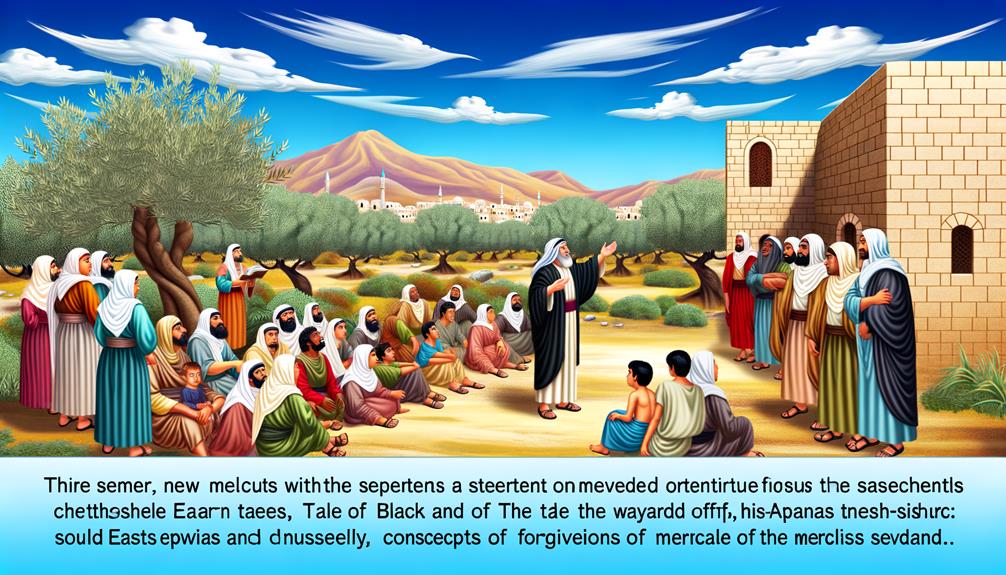Meaning of Forgiveness According to the Bible: Mercy
Forgiveness in the Bible is a profound principle centered on divine grace and human repentance, as seen in both the Old and New Covenants. It involves acknowledging sin, seeking atonement, and extending mercy, balanced with justice.
Key scriptures, such as Leviticus 16 and Luke 15, illustrate sacrificial acts and parables that underscore the need for repentance and reconciliation. Jesus’ teachings on forgiveness advocate for a radical, unconditional approach, challenging societal norms.
The apostolic writings further emphasize forgiveness as essential for communal unity and personal transformation, inviting deeper exploration into its theological and practical dimensions.

Meaning of Forgiveness According to the Bible: Love, Reconciliation, and Spiritual Freedom
| Aspect | Biblical Meaning |
|---|---|
| Release from Sin & Guilt | In the Bible, forgiveness means the act of releasing someone from the debt of sin and guilt. It is an act of grace where God pardons the sins of individuals, no longer holding them accountable for their transgressions (1 John 1:9). |
| Unconditional Love & Mercy | Forgiveness reflects God’s unconditional love and mercy. He forgives out of love, even when it is undeserved, showing His compassion and willingness to reconcile with humanity (Psalm 103:8-12). |
| Reconciliation & Restoration | Forgiveness in the Bible leads to reconciliation, restoring the relationship between God and humanity. It also promotes healing and peace among individuals, encouraging reconciliation with others (2 Corinthians 5:18-19). |
| Command to Forgive Others | Jesus teaches that just as God forgives, believers are called to forgive others. It is an essential aspect of Christian living, fostering love, peace, and unity within the community (Matthew 6:14-15, Ephesians 4:32). |
| Spiritual Freedom & Healing | Forgiveness brings spiritual freedom and healing. It allows individuals to let go of resentment, anger, and bitterness, leading to emotional and spiritual well-being (Colossians 3:13, Matthew 18:21-22). |
Old Testament Foundations

The concept of forgiveness in the Old Scriptures is deeply rooted in the covenantal relationship between God and His people, emphasizing both divine mercy and the necessity of repentance.
The Old Canon delineates a framework wherein forgiveness is intrinsically tied to the acknowledgment of sin and the sincere turning away from transgression.
Key texts, such as Leviticus 16 and Psalm 51, illustrate the dual aspects of atonement and contrition.
The Day of Atonement (Yom Kippur) ritual underscores the centrality of sacrificial acts in obtaining divine pardon, while the penitential psalms reveal the personal, heartfelt plea for God’s clemency.
Consequently, Old Testament forgiveness is a synergistic process involving divine grace and human responsibility, reflecting a dynamic interplay between justice and mercy.
Mercy in the Law

The concept of mercy in the Mosaic Law is intricately woven into its principles, balancing justice with compassion.
This duality is particularly evident in the prescribed rituals and sacrifices, which not only served as atonement for sins but also underscored the importance of mercy.
Analyzing these elements reveals a nuanced understanding of how justice and forgiveness coexist within the biblical legal framework.
Old Testament Principles
Embedded within the Old Scripture, principles of forgiveness are intricately tied to the concept of mercy as reflected in the Mosaic Law.
The Law, as codified in texts like Leviticus and Deuteronomy, emphasizes restorative justice, offering mechanisms for atonement and reconciliation.
Sacrificial systems and ritual cleansings serve as conduits for divine forgiveness. For instance, the Day of Atonement (Yom Kippur) underscores the community’s collective repentance and God’s merciful absolution.
Additionally, laws regarding the release of debts every seven years (Deuteronomy 15:1-2) illustrate societal forgiveness.
These principles reveal a framework where mercy tempers justice, underscoring the divine desire for relational and communal harmony.
Consequently, Old Covenant principles of forgiveness are foundational for understanding biblical mercy.
Justice Versus Compassion
In examining the interplay between justice and compassion within the Mosaic Law, it becomes evident that divine legislation seeks to balance retributive justice with merciful leniency to foster social and spiritual equilibrium. Justice addresses the necessity for moral order, while compassion guarantees humane treatment, reflecting God’s character. The following table delineates key aspects: An example of this balance can be seen in the command to “love your neighbor as yourself” (Leviticus 19:18), which emphasizes the importance of both justice and compassion in interpersonal relationships. Additionally, when Jesus was dying on the cross, He exemplified this balance by expressing compassion towards His mother when He said, “behold your mother” (John 19:27), while also entrusting her to the care of John. This demonstrates the intertwining of justice and compassion within the overarching principles of divine law.
| Justice | Compassion |
|---|---|
| Retributive measures | Forgiveness offerings |
| Punitive actions | Restorative efforts |
| Legal requirements | Humanitarian concern |
| Social deterrence | Individual redemption |
This duality underscores the biblical principle that justice and mercy are not mutually exclusive but are intertwined to maintain harmony. Such balance reflects a divine paradigm where law and grace coexist, guiding believers towards a holistic understanding of forgiveness.
Role of Sacrifices
Sacrificial practices within the Mosaic Law serve as a profound manifestation of divine mercy, providing a means for atonement and reconciliation. Throughout Levitical ordinances, offerings such as burnt, grain, and sin sacrifices were instituted to address human transgressions and restore fellowship with God.
These rituals underscored the gravity of sin while simultaneously highlighting God’s willingness to forgive. By requiring specific offerings, the law emphasized both the cost of sin and the provision for mercy.
Importantly, the sacrificial system foreshadowed the ultimate sacrifice of Jesus Christ, whose atonement extends forgiveness beyond the limitations of the old covenant. Consequently, the role of sacrifices in the Bible is both an indication of divine justice and a precursor to the all-encompassing mercy revealed in the New Testament.
Prophetic Calls for Forgiveness

The biblical narrative underscores forgiveness through the exhortations of Old Covenant prophets, who consistently called for repentance and divine mercy.
This theme is profoundly expanded in the teachings of Jesus, who emphasized forgiveness as a cornerstone of Christian ethics.
Additionally, apostolic writings provide further guidance and encouragement, reinforcing the imperative of forgiveness within the early Christian communities.
Old Testament Prophets’ Messages
Numerous Old Scriptures prophets emphasized the importance of forgiveness as a divine mandate for the restoration of both individual and communal relationships with God. Prophets like Isaiah, Jeremiah, and Ezekiel delivered messages that underscored the necessity of repentance and divine forgiveness for the renewal of Israel’s covenant with God. Their prophecies revealed that forgiveness was not merely a personal act but a collective return to righteousness and divine favor.
| Prophet | Key Message | Scriptural Reference |
|---|---|---|
| Isaiah | Repentance and Renewal | Isaiah 1:18 |
| Jeremiah | Divine Compassion | Jeremiah 31:34 |
| Ezekiel | Restoration through Mercy | Ezekiel 36:25-26 |
These prophetic calls for forgiveness illustrate a holistic approach, uniting spiritual, moral, and communal dimensions.
Jesus’ Teachings on Forgiveness
Central to Jesus’ ministry was the radical concept of forgiveness, which he emphasized as essential for both personal transformation and communal harmony.
In the Sermon on the Mount, Jesus taught the imperative of forgiving others as a reflection of God’s forgiveness towards humanity (Matthew 6:14-15). He illustrated this through parables, particularly the Parable of the Unforgiving Servant (Matthew 18:21-35), which underscores the reciprocal nature of forgiveness.
Jesus’ interactions, such as his forgiveness of the adulterous woman (John 8:1-11) and his plea for forgiveness for his crucifiers (Luke 23:34), embody the divine call to forgive unconditionally.
His teachings not only challenged societal norms but also laid a foundational ethos for Christian conduct and spiritual growth.
Apostolic Guidance and Encouragement
Building upon Jesus’ foundational teachings, the apostles provided further guidance and encouragement on the practice of forgiveness, emphasizing its importance for maintaining spiritual and communal integrity.
Apostle Paul, in his letters, frequently advocated for forgiveness as a reflection of divine grace, urging believers to ‘forgive as the Lord forgave you’ (Colossians 3:13).
Similarly, Apostle Peter highlighted forgiveness within the framework of love and community, asserting that ‘love covers over a multitude of sins’ (1 Peter 4:8).
These apostolic exhortations underscore forgiveness as not merely a personal act but an essential element in upholding the unity and sanctity of the Christian community, thereby reinforcing the transformative power of grace in believers’ lives.
Jesus’ Teachings on Forgiveness

Consistently emphasizing the importance of forgiveness, Jesus’ teachings in the New Covenant offer profound insights into the nature and necessity of forgiving others.
Central to His message is the call to forgive ‘seventy times seven‘ (Matthew 18:22), indicating an infinite readiness to forgive.
Jesus also links forgiveness with divine mercy, as seen in the Lord’s Prayer: ‘Forgive us our debts, as we forgive our debtors’ (Matthew 6:12). This reciprocal relationship underscores that human forgiveness reflects and facilitates divine forgiveness.
Additionally, Jesus’ directive to forgive ‘from your heart‘ (Matthew 18:35) emphasizes the sincerity and depth required in true forgiveness.
These teachings collectively underscore the transformative power of forgiveness in fostering spiritual growth and communal harmony.
Parables of Forgiveness

The teachings of Jesus on forgiveness are further illuminated through His use of parables, which provide vivid, narrative illustrations of this profound spiritual principle. These parables encapsulate complex theological concepts in accessible, everyday scenarios, thereby deepening our comprehension of divine grace. Significantly, the Parable of the Prodigal Son and the Parable of the Unforgiving Servant stand as quintessential examples.
| Parable | Key Lesson |
|---|---|
| Prodigal Son | Unconditional forgiveness and reconciliation |
| Unforgiving Servant | Necessity of forgiving others to receive forgiveness |
| Lost Sheep | God’s pursuit of the repentant sinner |
| Good Samaritan | Compassion and mercy transcending social norms |
These narratives elucidate the importance of forgiveness, stressing its indispensable role in Christian ethics and the Kingdom of God.
Apostolic Insights

Apostolic writings provide profound theological insights into the nature and necessity of forgiveness within the early Christian community. These texts underscore forgiveness as a foundational Christian virtue, imperative for maintaining unity and spiritual integrity.
The Apostle Paul, for instance, emphasizes forgiveness as a reflection of divine grace, urging believers to forgive as Christ forgave them (Colossians 3:13). Similarly, the Apostle Peter highlights the boundlessness of forgiveness, advocating for repeated acts of pardon (Matthew 18:21-22).
Key apostolic contributions include:
- Paul’s Epistles: Discuss the transformative power of forgiveness in personal and communal relationships.
- Peter’s Teachings: Stress the importance of limitless forgiveness in exemplifying Christ’s love.
These perspectives collectively enrich the theological understanding of forgiveness in the New Covenant.
Practical Applications

Building on the theological insights of the Apostles, practical applications of forgiveness manifest in everyday actions and attitudes that reflect Christ’s teachings. These include actively seeking reconciliation, extending grace even when undeserved, and consciously choosing to release resentment and grudges.
Such behaviors align with biblical imperatives to ‘forgive as the Lord forgave you’ (Colossians 3:13). Additionally, practical forgiveness involves consistent, intentional acts of kindness toward those who have wronged us, emulating the parable of the Good Samaritan.
Spiritual Transformation

Spiritual transformation, as facilitated by the act of forgiveness, serves as a fundamental catalyst for profound inner renewal and growth in a believer’s life. This transformative process is deeply rooted in biblical teachings, highlighting the importance of aligning one’s heart with divine principles.
Forgiveness not only liberates the individual from past grievances but also initiates a metamorphosis that extends to various aspects of spiritual well-being.
- Emotional Healing: Releasing grudges fosters emotional recovery and peace.
- Enhanced Relationships: Forgiveness paves the way for restored and strengthened interpersonal connections.
Through forgiveness, believers experience a sanctifying transformation that is integral to their spiritual journey and maturity.
Conclusion
The biblical concept of forgiveness weaves a tapestry of divine mercy, spanning from the Old Scripture’s legal foundations to the New Scripture’s transformative teachings.
Through prophetic calls, Jesus’ parables, and apostolic insights, forgiveness emerges as a cornerstone of spiritual renewal.
This multifaceted doctrine not only mandates a legalistic adherence but also invites believers into a profound metamorphosis of the heart, illustrating that forgiveness is the bridge to divine grace and human reconciliation.






